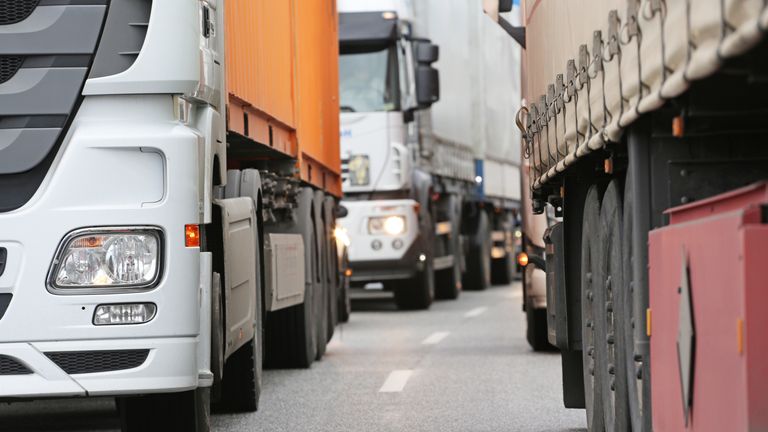HGV driving tests will be relaxed to allow 50,000 more to be taken in an attempt to tackle the shortage of lorry drivers ahead of Christmas, the transport secretary has announced.
Grant Shapps said that following a consultation, three changes will happen to speed up the process after the suspension of tests during the pandemic, plus Brexit, has resulted in a lack of drivers to deliver essential goods.
Businesses across Britain have reported major problems in their supply chains in recent months leaving some shop shelves empty. Sky News explains what is causing these shortages.The changes are:
• From 20 September, car drivers who passed their tests after 1996 will no longer need to take another test to tow a trailer or caravan up to 3,500kg (driving licences pre-1997 are already allowed to). The government says this will allow about 30,000 more HGV driving tests to be taken each year
• Tests will be made shorter, with the reversing exercise element removed and the uncoupling and recoupling exercise for trailer tests removed – and they will not have to be tested separately by a third party
Advertisement• Articulated vehicle drivers will no longer have to get a licence for a smaller vehicle first. The government says this will allow about 20,000 more HGV tests each year and means drivers can gain licences and enter the industry more quickly.
As part of our roadmap to tackle the HGV driver shortage affecting countries across the world, today I’ve announced that we will add 50,000 more HGV driving tests a year, on top of the 50% increase in tests that @DVSAgovuk has already added🚚🚚🚚
— Rt Hon Grant Shapps MP (@grantshapps) September 10, 2021Mr Shapps said the changes will “streamline” the tests but will not “reduce the rigour of the test”.
More on Brexit Related Topics: BrexitCOVID-19CoronavirusRetailEarlier this year, the government increased HGV testing by 50% compared with before the pandemic but shortages have continued and ministers were said to be “deeply worried about Christmas”.
Richard Burnett, chief executive of the Road Haulage Association, earlier told Sky News removing the first test for articulated lorry drivers will not help.
He said: “This is not going to solve the problem in the short-term because the sheer numbers we need, we cannot train sufficient numbers between now and Christmas to salvage Christmas.
“We need access to foreign labour through the shortage of occupation list or temporary visas in order to bring people in.
“This simply will not solve the crisis and this crisis is getting worse by the week, it’s not getting better.”
Why are UK businesses being hit by shortages at the moment?
Almost 50,000 drivers have left the road in the last two years thanks to a combination of the pandemic and Brexit, leaving hauliers struggling to keep trucks on the road and businesses in multiple sectors struggling to keep up with demand.
The UK economy’s reliance on road haulage means sectors across the economy have been affected, from supermarkets and restaurants that have reported food shortages, to public health, with delays to deliveries of flu vaccinations and the water purification chemicals required to process sewage.
Mr Shapps said: “We’ve got 1.6 million people coming off furlough in September, some people will be attracted, perhaps, by a new profession.
“So I think we’ve got the people, what we need to have is the system to allow people to get those tests, and in addition to having already increased the capacity by 50%, today’s extra 50,000 tests should go a long way to doing that, to guarantee that food and retail supplies at Christmas aren’t going to be affected by this.”
Image: Supermarkets and restaurants have reported food shortagesHe added that the UK is not alone in experiencing driver shortages, with Europe needing 400,000 more lorry drivers and the US also struggling to fill posts.
The new changes are set to speed-up tests, however, hauliers, supermarkets and the Confederation of British Industry (CBI) agree that granting European drivers short-term visas is the only way to deal with the short-term crunch caused by the build-up to Christmas.
About 14,000 European drivers had left the UK by June 2020 and only 600 had returned a year later after the Brexit transition period ended on 31 December, 2020.
